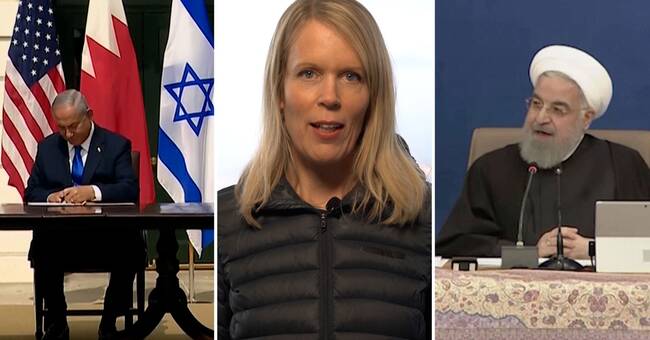US foreign policy affects everyday life in the Middle East.
Washington is involved in several conflicts in the region, and ahead of the change of power in the White House, the temperature has risen, not least in terms of hostility to Iran.
So how will US relations with Middle Eastern leaders change when Joe Biden is sworn in?
Here are some key points to keep in mind:
New tensions between US and Iran
The biggest change in US Middle East policy under Joe Biden seems to be the relationship with Iran.
Biden wants to breathe life into the international nuclear energy agreement that the United States left under Trump's leadership, and even the future US Secretary of State Antony Blinken argues for "a longer and stronger agreement with Iran".
Trump's last days in power have been marked by mutual threats and accusations after Iran increased uranium enrichment and seized a South Korean oil tanker in the Persian Gulf.
Iranian television shows images of test firings of cruise missiles and extensive military exercises at sea in a show of force against new US sanctions against the country.
Since the US left the nuclear deal in 2018, tensions between Washington and Tehran have increased.
Exactly one year ago, the boiling point was reached after the United States killed Iranian General Qassem Soleimani in a drone attack in Baghdad.
The world held its breath in fear of war.
If the United States is to return to the nuclear agreement, Iran must live up to its commitments and fully comply with the rules of the agreement.
The relationship between Israel and the Arab world
Trump's son-in-law Jared Kushner has led the negotiations, which in a short time have led to peace agreements between Israel and four Arab states: the United Arab Emirates, Bahrain, Sudan and Morocco.
Biden is expected to move forward with the peace agreements and more Arab countries are believed to normalize their diplomatic relations with Israel.
But Biden has signaled that he is not happy with how Trump has handled the Palestinians and has said he wants to see a "genuine two-state solution".
The American embassy that was moved to Jerusalem under Trump stays there.
Biden plans to resume aid to the Palestinians and is also expected to open the Palestinian diplomatic mission in Washington, which was closed during Trump's rule.
"End of the eternal wars"
Ahead of the November election, Trump campaigned for an end to the "eternal wars" - and decided that the number of US troops in Afghanistan should be reduced from 4,500 to 2,500, and that troops in Iraq should be reduced from 3,000 to 2,500.
Biden also wants to take home soldiers from conflict hotspots abroad, but is not in such a hurry.
The fight against the terrorist organization IS in Iraq continues, and Biden may stop the rapid withdrawal from Afghanistan.
Human Rights
In both Saudi Arabia and Egypt, a somewhat cooler relationship with the United States is expected from 20 January.
Trump has called Egyptian President Abdel Fattah al-Sisi his "favorite dictator" and said he had protected Saudi Crown Prince Mohamed Bin Salman from criticism following the bestial massacre of Saudi journalist Jamal Khashoggi.
Joe Biden threatens to make Saudi Arabia "the pariah state they are" if human rights violations continue.
But Biden has major challenges at home and issues of human rights abroad are unlikely to top the US agenda.

